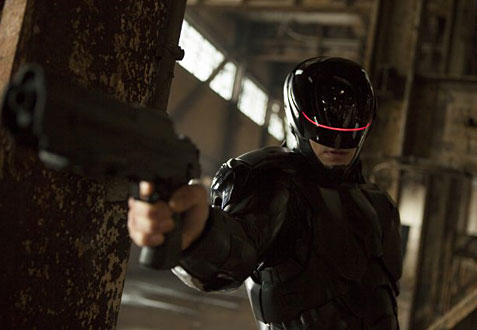
At the rate that Hollywood is plowing its way through Paul Verhoeven’s sci-fi catalog, you’d expect Vegas bookies to start slashing the odds on an eventual “Starship Troopers” remake. Though it’s only been two years since fanboys got their panties in a bunch over Len Wiseman’s “Total Recall” reboot, many of those same fans have been dreading the release of the new “RoboCop.” It will probably come as a surprise, then, that the film isn’t nearly as bad as people feared it would be. In fact, it boasts a better cast, better effects and a better story, even if the 1987 original – which is admittedly pretty cheesy by today’s standards – is still the better movie. So why bother with this remake? For starters, because it’s not really a remake at all, instead taking the basic premise and carving its own path that falls more in line with current politics.
The year is 2028, and with the exception of the United States, the rest of the world is now policed by a robot military force operated by technology giant OmniCorp. The government has blocked the use of robots in the U.S. due to the belief that they can’t be held accountable for killing, so OmniCorp CEO Raymond Sellars (Michael Keaton) decides to give the American public someone they can identify with by putting a man in a machine. And it’s not long before they find the perfect subject when Detroit cop Alex Murphy (Joel Kinnaman) is critically injured in a car bombing after he’s targeted by a local drug kingpin. With the help of Dr. Dennett Norton (Gary Oldman), a pioneer in robotic prosthetics, Sellars convinces Alex’s wife, Clara (Abbie Cornish), that the procedure is the only way to keep him alive. But the very thing that makes Alex unique (his emotions) also affects his performance in the field, and when Norton tries to counteract that by programming his brain to act more like a machine, Alex’s human side begins to fight back as he investigates his own murder.
A major studio would never be able to make a movie like the original “RoboCop” these days, so it’s not surprising that the update is relatively toned down compared to Verhoeven’s clever mix of subversive satire and visceral violence. With that said, it’s not just a mindless action film. More of a commentary on U.S. foreign policy and drone warfare than corporate greed (though it still plays a role here), the movie also has some interesting thoughts on free will and the morality of robotics. The political stuff is laid on a little too thick at times via Samuel L. Jackson’s radical right-wing television host, and therefore not as effective, but it’s worth noting that director Jose Padilha (best known for the “Elite Squad” films) hasn’t shied away from making his “RoboCop” actually be about something other than a man in a cool robotic suit.
The film starts off surprisingly well – especially the scenes between Kinnaman’s recovering cop and Oldman’s conflicted doctor in the OmniCorp labs – but it begins to drag in the middle and never quite recovers. The problem is twofold. Firstly, with the exception of Kinnaman, Oldman and Jackie Earle Haley in a fun supporting role, most of the other talent is wasted. Keaton doesn’t get much to chew on as the nefarious head of OmniCorp, while others like Michael K. Williams (as Alex’s partner), Jennifer Ehle and Jay Baruchel only get a few lines of dialogue each. The lack of a standout villain doesn’t help matters, especially when Kurtwood Smith’s sleazy hitman was so memorable in Verhoeven’s version.
Additionally, while the action scenes aren’t terrible, they’re not quite as exciting as you’d expect from a modern day “RoboCop” movie. This was Padilha’s big opportunity to compensate for the much-derided PG-13 rating, but between the annoying shaky cam and his tendency to cut away from the action too early, many of the set pieces are scattershot at best. It’s frustrating to watch unfold, but then again, that’s “RoboCop” in a nutshell. The fact that it’s not a complete failure will feel like a win to some fans, but while this slick and overproduced update could have been a lot worse, its inability to capitalize on the promise that it shows early on is perhaps the biggest disappointment.
Related Posts
Posted in: Entertainment, Movie Reviews, Movies
Tags: Gary Oldman, Joel Kinnaman, Michael Keaton, RoboCop, RoboCop review
















